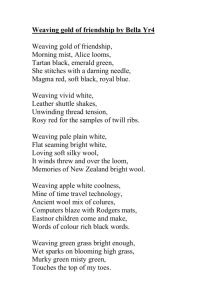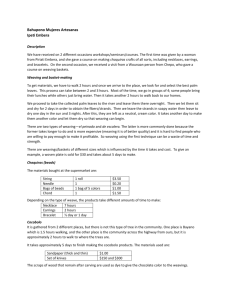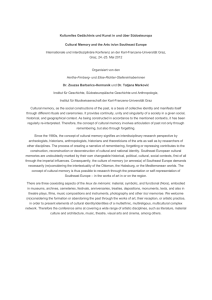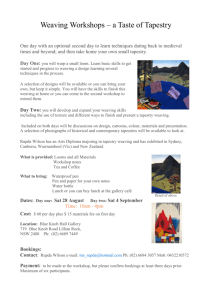Worms - Literatures, Cultures Languages
advertisement
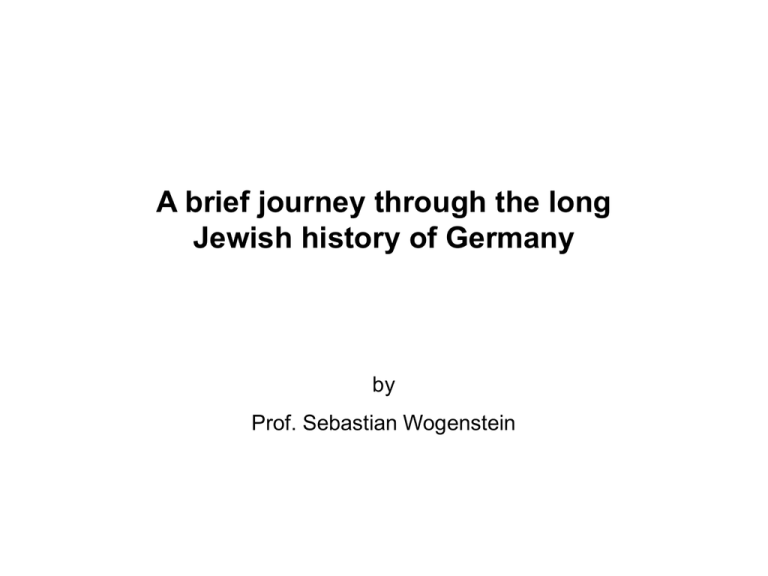
A brief journey through the long Jewish history of Germany by Prof. Sebastian Wogenstein 321 . 400 BCE The Jewish diaspora A papal decree (1215) forced Jews to wear pointed hats Jews being burned (1348) Rashi רש''י Rabbi Shlomo ben Yitzchak (1040-1105) Rashi-Chair at the synagogue of Worms In the Jewish quarter of Worms Rashi House Worms Speyer Speyer – Worms – Mainz: Three cities with major Jewish communities and yeshivot (religious academies) in Germany – when written in Hebrew letters, often abbreviated as „shoom“ שו''ם because of the city names‘ first letters – in Hebrew „shoom“ means „garlic“ Mainz Darmstadt Haggadah (< 1391) Allegories: Ecclesia (church) and Synagoga at the Strasbourg cathedral – Christian theology propagated the image of the Church as triumphing over broken Judaism (broken lance, blindfolded, broken stone tablet) Moses Mendelssohn (1729-1786) Philosopher and translator; with his contributions to the Enlightenment in Germany, one of the founders of modern German culture Gotthold Ephraim Lessing's drama Nathan the Wise (1779) – dealing with conflicts between Christianity, Judaism, and Islam; suggesting a resolution of these conflicts in underscoring the equality of humans regardless of their religious affiliation Christian Wilhelm Dohm demands full legal equality for Jews in his treatise On the Civic Improvement of the Jews (1781) Declaration of Human Rights (French Revolution 1789) Early 19th-Century Salons Rahel Levin-Varnhagen "Republic of free spirit" - Rahel Levin-Varnhagen's "Tea- and Conversation Society" Henriette Herz Heinrich Heine (1797-1856) Poet Rhine-Valley: The Loreley Die Lorelei Ich weiß nicht, was soll es bedeuten, Daß ich so traurig bin; Ein Märchen aus alten Zeiten, Das kommt mir nicht aus dem Sinn. Die Luft ist kühl und es dunkelt, Und ruhig fließt der Rhein; Der Gipfel des Berges funkelt Im Abendsonnenschein. Die schönste Jungfrau sitzet Dort oben wunderbar, Ihr goldnes Geschmeide blitzet, Sie kämmt ihr goldenes Haar. Sie kämmt es mit goldenem Kamme, Und singt ein Lied dabei; Das hat eine wundersame, Gewaltige Melodei. Den Schiffer im kleinen Schiffe Ergreift es mit wildem Weh; Er schaut nicht die Felsenriffe, Er schaut nur hinauf in die Höh'. Ich glaube, die Wellen verschlingen Am Ende Schiffer und Kahn; Und das hat mit ihrem Singen The Loreley I cannot determine the meaning Of sorrow that fills my breast: A fable of old, through it streaming, Allows my mind no rest. The air is cool in the gloaming And gently flows the Rhine. The crest of the mountain is gleaming In fading rays of sunshine. The loveliest maiden is sitting Up there, so wondrously fair; Her golden jewelry is glist'ning; She combs her golden hair. She combs with a gilded comb, preening, And sings a song, passing time. It has a most wondrous, appealing And pow'rful melodic rhyme. The boatman aboard his small skiff, Enraptured with a wild ache, Has no eye for the jagged cliff, His thoughts on the heights fear forsake. I think that the waves will devour Both boat and man, by and by, And that, with her dulcet-voiced power Was done by the Loreley. Käthe Kollwitz – Der Weberaufstand (1897/98) Die schlesischen Weber Im düstern Auge keine Träne, Sie sitzen am Webstuhl und fletschen die Zähne: Deutschland, wir weben dein Leichentuch, Wir weben hinein den dreifachen Fluch – Wir weben, wir weben! Ein Fluch dem Gotte, zu dem wir gebeten In Winterskälte und Hungersnöten Wir haben vergebens gehofft und geharrt, Er hat uns geäfft und gefoppt und genarrt – Wir weben, wir weben! Ein Fluch dem König, dem König der Reichen, Den unser Elend nicht konnte erweichen, Der den letzten Groschen von uns erpreßt, Und uns wie Hunde erschießen läßt – Wir weben, wir weben! Ein Fluch dem falschen Vaterlande, Wo nur gedeihen Schmach und Schande, Wo jede Blume früh geknickt, Wo Fäulnis und Moder den Wurm erquickt – Wir weben, wir weben! Das Schiffchen fliegt, der Webstuhl kracht, Wir weben emsig Tag und Nacht – Altdeutschland, wir weben dein Leichentuch, Wir weben hinein den dreifachen Fluch, Wir weben, wir weben! The Silesian Weavers In somber eyes no tears of grieving; Grinding their teeth, they sit at their weaving: O Germany, at your shroud we sit, We’re weaving a threefold curse in it— We’re weaving, we’re weaving! A curse on the God we prayed to, kneeling With cold in our bones, with hunger reeling; We waited and hoped, in vain persevered, He scorned and duped us, mocked and jeered— We’re weaving, we’re weaving! A curse on the king of the rich man’s nation Who hardens his heart at our supplication, Who wrings the last penny out of our hides, And lets us be shot like dogs besides— We’re weaving, we are weaving! A curse on this false fatherland, teeming With nothing but shame and dirty scheming, Where every flower is crushed in a day, Where worms are regaled on rot and decay— We’re weaving, we’re weaving! The shuttle flies, the loom creaks loud, Night and day we weave your shroud— Old Germany, at your shroud we sit, We’re weaving a threefold curse in it, We’re weaving , we’re weaving! Neue Synagoge Berlin (1866) Neue Synagoge Berlin (today) Royal decree, abolishing restrictions based on religious affiliation (1869) German-Jewish soldiers in the Franco-Prussian War (1870/71) Rosa Luxemburg Sigmund Freud Franz Kafka Carl Laemmle (founder of Universal Studios) with Erich Maria Remarque (author of All Quiet on the Western Front) Bar Kochba sports club parading after a relay race, Munich 1932 Albert Einstein Anna Seghers (Netty Reiling) Racist “Nuremberg Laws“ 1935 1933 "Jews not welcome in Behringersdorf" Jewish men deportet to the concentration camp Buchenwald "Kristallnacht" Anti-Jewish pogroms in all German cities and towns November 9, 1938 Deportations after the defeat of the Warsaw Ghetto uprising in 1943 Allied troops entering the concentration camp Buchenwald in 1945 Murdered victims of the Holocaust > 6 million Jews > 1.9 million Gentile Poles & Russians ca. 800,000 Roma & Sinti ca. 300,000 people with disabilities ca. 100,000 communists ca. 25,000 homosexual men ca. 2,000 Jehovah's Witnesses Glasses of victims at the death camp Auschwitz "For us Jews from Germany, an historical epoch has come to an end. Such an epoch ends whenever a hope, a belief, a trust has finally to be buried. Our belief was that the German and the Jewish spirit could meet on German soil and through their marriage become a blessing. This was an illusion – the Jewish epoch in Germany is over, once and for all." Leo Baeck in New York 1945, after his liberation from the Theresienstadt concentration camp According to the Central Council of Jews in Germany (http://www.zentralratdjuden.de), Jewish communities in Germany have about 100,000 officially registered members today. With the continuing immigration from Eastern Europe, the numbers are likely to rise. Young German-Jewish writers, film-makers, and other artists are a distinctive and important voice on the German, Austrian, and Swiss cultural scene. Many of them immigrants themselves, their identity claims usually emphasize difference, alliances with other migrants, multi-culturalism, and a critical evaluation of their relationship with the State of Israel. Topography and double vision: Contemporary German-Jewish literature 1) Significance of places for memory in general and in the Jewish tradition in particular 2) Topo-graphy - topos (Greek): place, topic, theme - graphein (Greek): to write, to inscribe 3) Place names and German-Jewish history: Landscapes/topographies of memory 4) Exterritorialities: language 5) "Topography of loss" – metaphors of loss; traces of history in the body; writing not instructive, rather exemplary 6) Migrant literature Katja Behrens (born 1942) Collective memory of the Holocaust as foundation of tolerance and human rights - Model function of trials on crimes against humanity: e.g. the Nuremberg Trials 1945/46, Eichmann Trial 1961, Frankfurt Auschwitz Trial 1965 – International Court of Justice, The Hague (Netherlands) - "Second modernity" as a deterritorialized modernity – diaspora as the human condition - "Universalization" of the Holocaust (Daniel Levy/Natan Sznaider) vs. particularization in the national collective memory - What is "home" ("Heimat")? – Henryk Broder's essay "Heimat? – No thanks!"

